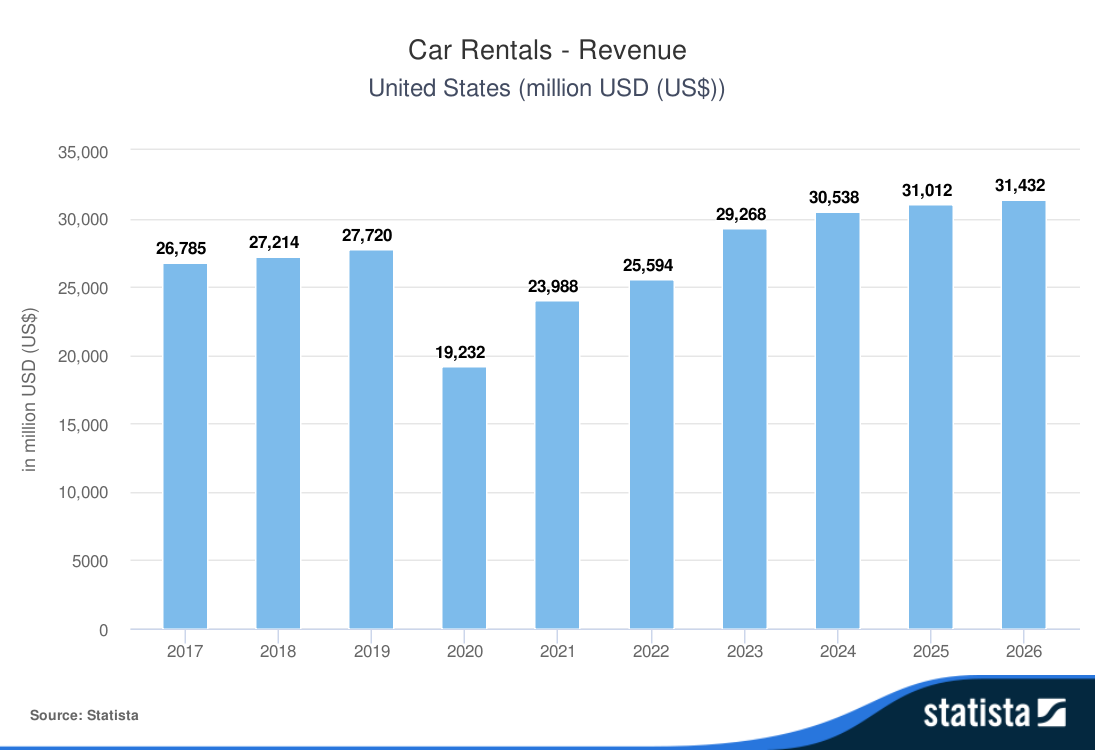
Photo Credit: Deposit Photos
An unexpected cross-country trip wasn’t something Jenavy Castro-Hernandez thought she and seven other family members would be doing, but when her uncle’s job sent him to New York, they packed their things, ready to meet him there by March 14. Arranging five children and three adults into her aunt’s old van, they prepared to make the long trek across the country from Santa Ana, Calif., to Nanuet, N.Y., instead of renting an SUV.
“We looked at prices but since we were already spending like $700 on just the room, it’s like we might as well just take the van and pay the gas,” Castro-Hernandez said.
She is one of 41 million who are expected to rent a car this year, but will find higher prices as a result of inflation, interest rate hikes and supply chain bottlenecks. The chaos in the rental car market is symbolic of the turmoil of the economy. At the initial height of the COVID-19 pandemic, major rental companies sold off nearly 800,000 cars from their fleet due to a lack of demand. With mandates relaxing and more than 65% of the total U.S. population vaccinated, companies have found themselves unable to rebuild their supply.
At the same time, as people resume their day-to-day lives through the pandemic, a resurgence for rental cars has grown. With remote work in place for some, leisure trips became the only way to do something outside of their homes—even if it cost more than they expected.
When the World Health Organization declared COVID-19 a global pandemic in March 2020, the United States Peace Corps volunteers were evacuated worldwide. Max Sullivan, who had been in Botswana, had returned to Los Angeles, Calif., before he and a fellow corps volunteer decided to meet in Las Vegas, Nev., a year later. He had a free room with MGM member points, so all he needed was a rental to get him from one city to the other.

“I found a car that I think was around $150 for like three days,” Sullivan said. “I was like, ‘Okay, I can do that.’ So, I booked the car for that same day.”
Except, when he arrived at the Hertz location on Reseda Blvd in Reseda, Calif., a few hours later, he was told they had no cars.
“I started calling other places and driving down Reseda when I found an Enterprise,” Sullivan said. “I ended up renting a car for like $200 more. I never would have gone on the trip if I knew a rental car would cost me that much money.”
There doesn’t seem to be any relief in sight as rental car companies keep their prices high while they rebuild their fleets. Stephen Stanley, chief economist for Amherst Pierpont Securities, said while all vehicle prices are beginning to flatten out, they will likely remain high affecting both consumers and businesses.
February showed a declining price for used cars, falling 0.2 percent, while new vehicles increased 0.3 percent. Stanley said things will eventually improve, but it’s going to take a while given the overlapping effects from a lack of production, sales, semiconductor and labor shortages and inflation due to high demand across the board.
“We’re not going to snap our fingers and be back to normal,” Stanley said. “It’ll be a slow but steady improvement.”
Revenue for car rentals is projected to reach $25.5 million in 2022, which is still $2.1 million less than 2019, according to Statista’s 2021 Mobility Services Report. Companies are looking to make up lost revenue by keeping their daily prices higher than they were prior to the pandemic.

Since prices have nearly doubled in some cities, consumers have turned to alternative methods for their needs. Turo, a company that allows private car owners to rent out their vehicles via its app or online, is one of many that people use to save money.
“It’s like Airbnb, but for cars,” Jordan Gentry said.
Gentry, who lives in Seattle, Wash., said one of the biggest benefits of using services like Turo is that a person gets exactly what they want because they choose the car and know the price upfront.
“We were there in Georgia for like 10 days and we had the car for eight or nine of those days. We spent I think $300,” Gentry said. “If you go to a rental car place, you’ll spend like $1,000 or more.”
Like Gentry, Castro-Hernandez in Santa Ana, Calif., had looked into renting a cheap car to help her and her husband while their SUV was in the shop well before her cross-country trip, but they couldn’t afford the price.
“Just to rent a car out here for like a week was maybe almost $400,” Castro-Hernandez said. “And, like, I don’t know if they charge taxes or not because I’ve never done it before.”